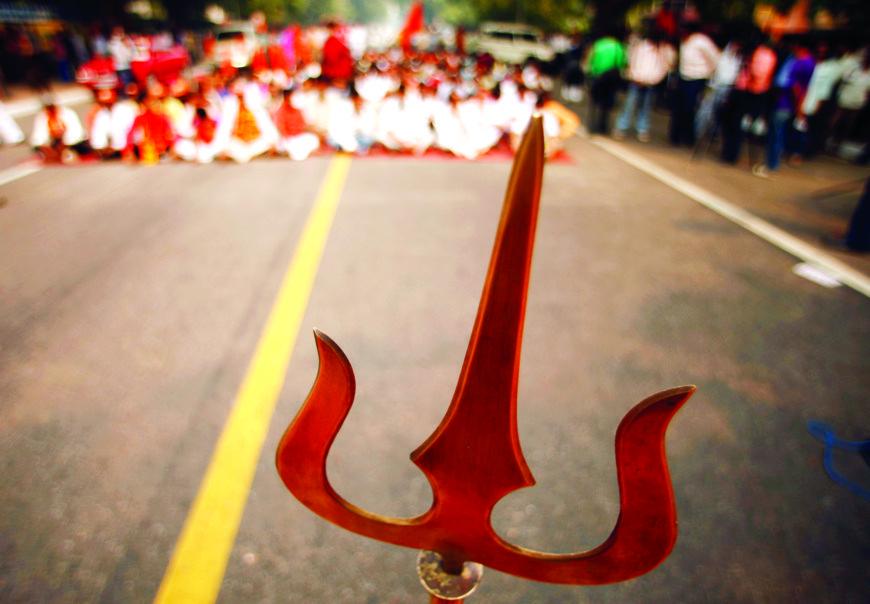The Business of the Hindutva Militias

The RSS chief has made claims about his organisation being “battle-ready”. Earlier, news about the film Padmavati, and gau rakshaks had become hot topics of discussion. The militia of the Sangh Parivar continues to make news.
In this context, probably it is apt to talk about the billion-dollar business that is Hindutva, and how riots and violence helps it to grow. We are often engaged in debates on Hindutva as an idea, but it is often felt that attempts to study it as a mass movement are limited. An idea, after all, does not spread without reason. For that to happen, it needs to turn into a material force. To understand this better, we need to understand how this material force operates. Here the material force is the RSS itself, and the Sangh Parivar which includes hundreds of organisations which are linked to it, whether they are formally affiliated to the RSS or not.
Let us look at a simple example of how the ‘economy’ of Hindutva works. South Karnataka, which includes the Mangalore belt, is a region where the Bajrang Dal, the criminal gang of the Sangh Parivar, is active and strong. The Bajrang Dal grew in this region by unleashing violence against the minority communities, especially the Muslims. The Muslim merchants of Mangalore city are among the biggest victims of the Bajrang Dal’s violence. To escape from this continuous street violence, the Muslim merchants are these days forced to hire the services of a major security agency in Mangalore city.
The owner of this security agency – Eshwari Manpower Solutions – is Sharan Pampwell. The amazing irony is, this very Sharan Pampwell is the South Karnataka convenor of the Bajrang Dal! In other words, the communal violence of the Bajrang Dal becomes the fodder for their own business. The situation is such that whoever is targeted by the intimidation and violence by Sharan and his followers have to pay for the services of their own enemy. Sharan himself says that the Muslim commercial establishments of Mangalore are his clients. (For details, see Shadow Armies: Fringe Organisations and Foot Soldiers of Hindutva by Dhirandra K Jha.)
Something thing that underworld dons and gangsters used to do illegally is being done here legally. It is their politics which is enabling the Sangh to do this. And they are doing it using an ideology which they use to justify their acts and a narrative they have developed in support of these acts.
The Sangh rallies people into their networks not just by injecting ideology, but also by making those people the beneficiaries of such networks at a material level.
For example, the workers of Eshwari Manpower Solutions are mostly activists of the Bajrang Dal. The common activists of the Bajrang Dal are often people who face caste discrimination and economic backwardness. Being a Sangh Parivar “worker” not only gives them some “social legitimacy”, but also a means of livelihood. People need both of these to survive. This is a major factor behind the growth of the Sangh Parivar, which is ideologically non-inclusive, and which justifies caste relations on the basis of an antiquated worldview, as a movement with major support among the Dalit-Adivasi-OBC sections. It has been able to do so by corrupting people ideologically as well as materially. Its entire machinery tries to bring both these elements together. It is not easy to destroy the support base it gains in this manner.
The anti-Padmavati riots have this dimension. There is speculation that groups like Karni Sena have been used for the movie’s publicity. But the relevant thing to note is the legitimacy that several fringe groups like Karni Sena has received. This is what the Sanghi government helped them gain by blindly encouraging the violence they unleashed. Thus an opportunity arose for them to engage in perfectly legal business. This is also a shortcut to build an economy, to rally people and to retain them in the fold. By letting such groups to control the law and order of a region, they are being given a free hand to bring the region in their grip. That is something that should concern us the most in the entire episode.
Disclaimer: The views expressed here are the author's personal views, and do not necessarily represent the views of Newsclick.
Get the latest reports & analysis with people's perspective on Protests, movements & deep analytical videos, discussions of the current affairs in your Telegram app. Subscribe to NewsClick's Telegram channel & get Real-Time updates on stories, as they get published on our website.






















